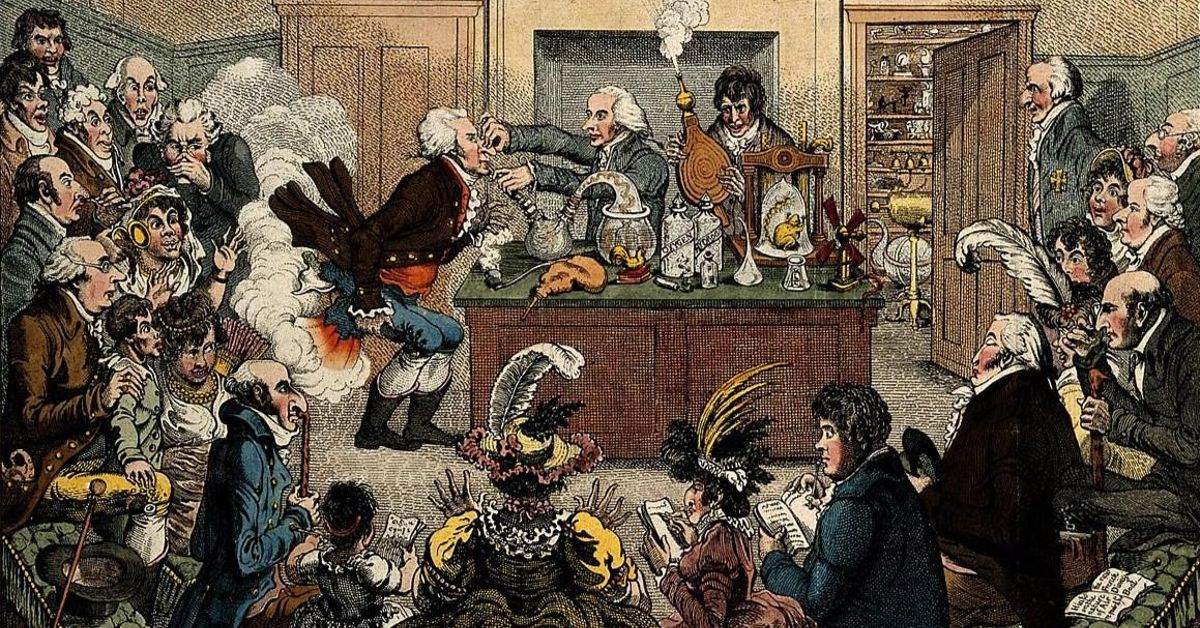funny flag

I return to reading those recreational physics books by Yakov Perelman, with a prolific narrative character, full of didactic pictures and edited in pure Spanish by the same Soviet publishing house Mir of Moscow, and a special sense of loss strikes me. I suspect the basic experiences described there, illustrated with examples from everyday life in the early twentieth century, where we were invited to play with strips of paper, coins, spoons, pins, or umbrellas no longer excite anyone. I can imagine how naive and boyish they are in the eyes of a generation that has grown up surrounded by advanced technology and considers itself a scientist, even though one views it as reckless and imaginative.
As we have dedicated ourselves to researching the infinitely large and the infinitely small, we no longer use our senses or our natural language to discover and describe the world, but rather, for the most part, the kind of blind man’s cane that is mathematics. Our calculations let us know that dark matter is there, but not let us touch it, and make the existence of other universes plausible, but they do not allow us to access it. Our senses, from being instruments of our knowledge, become what limits us, what prevents us from moving forward. Our current effort is precisely to break the bars of that cage. It is hard not to believe that our expectations lead to disappointment. By definition, in practice we can never transcend our perceptual limits, and what will be before us will be an increasingly inextricable set of abstractions.
Perhaps it is no coincidence that while our understanding of how the world works seems to be increasing, we are losing control of it. Every day we use sophisticated tools that arise from that abstract knowledge whose essential mechanism we do not know. We know where the buttons and levers are, but we don’t know how they do what they do. And not even a good part of those who build and program them know that. They are no longer tools in the original sense of the word, extensions of our being. They do not increase our capabilities, they replace them. Computers and self-driving cars—to put it bluntly—are not part of us, they don’t bring us closer to the world, at least not in the way a shovel, steam engine, or ballpoint pen did; They take us from him. We no longer deal with them, we put ourselves in their hands. In our daily lives, we don’t use our senses, our instincts, or our intelligence so much as we use a set of obscure algorithms stored in some erroneously friendly and closely hostile utensil.
The science surprised us. Now it leaves us unconscious, except for the practical applications it results in, which replace it and lose its power of seduction, like any other consumer object. Science and its depraved technological derivatives are increasingly far from our powers of conspiracy, and require us to put into play a belief that is the opposite of those elementary sensations. Our knowledge is increasingly alien to us, and no longer gives us that joy associated with discovering visible and tangible truths. The fact that science is “discovering” for some time now is annoyingly vague, it neither appeals to us nor makes us feel more competent, but more and more clumsy and limited beings who attract the overwhelming suspicion that they are no longer owners of what they themselves have created.
About this blog
We don’t know very well where we’re going, and we never did, even though we sometimes thought we did. But we’ve come this far and from here we leave every day to try to get somewhere else, trying not to lose our memory and use our critical sense as a compass. History – that is, those who fit it – will tell their story, but at the same time we refuse to close our eyes and stop using the word to tell our story. In legitimate defense.
* * * * * *
They don’t know ben bé a on anem, mai no ho hem sabut, face those vegades hem cregut yes. But here we arrived and from here we leave every day to try to get somewhere else, trying not to lose my memory and use Bruixola’s critical sense. The story – it must be told, those who fit it – will say the word, but at the same time we refuse to stop them and let faith serve the paragraph to say the word. In legitimate defense.

“Award-winning zombie scholar. Music practitioner. Food expert. Troublemaker.”


/cloudfront-eu-central-1.images.arcpublishing.com/prisa/AHVYMMDSTZDTDBFNZ3LMFUOKNE.jpg)








